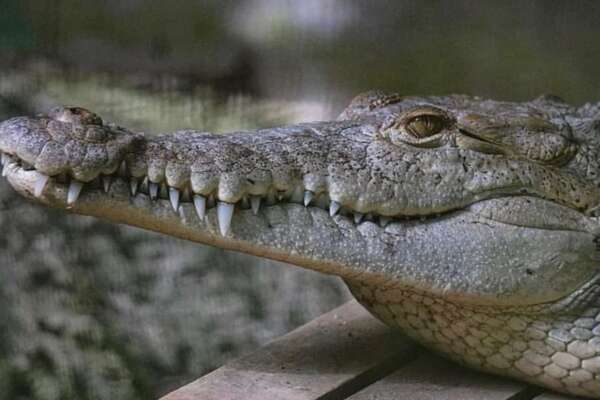
Biology
Max weight: 150-400 lbs
Lifespan: 50-70 years
Average # of offspring: 30-60
Range & Habitat
Habitats: Islands, Cayes, Atolls and coasts
Food & Function
Lifestyle: Nocturnal; Semi Aquatic
Ecological Roles: Apex Predator. Keystone species. Population control.
American Crocodile
(Crocodylus acutus)
Spanish: Cocodrilo. Belizean Creole: Aligata
American crocodiles are the larger of the two species of crocodiles in Belize. They are locally known as “alligata” but are in fact crocodiles; Belize has no alligators. Despite their strong preference for marine and brackish habitats, they are also able to thrive in freshwater when necessary. They are a different species from the Saltwater crocodile (Crocodylus porosus) which occurs in SE Asia and Australia.
American crocodiles will often be seen basking during the day, and do their hunting after dusk. Fish is a core part of their diet, along with other small to medium sized prey. They are considered less aggressive than other species of crocs, and only come into conflict with humans if there is a history of feeding them, whether intentionally or accidentally. It is illegal to feed or handle any wildlife in the wild in Belize.
Fun Facts
- Crocodiles have existed for over 65 million years
- Crocodiles have a “third” eyelid called the nictitating membrane that protects the eye of the crocodile when it’s submerged in water
- Crocodilians have around 60-70 teeth but some may have up to a 100!
- Compared to alligators that have U-shaped snouts and a strong preference for fresh water, crocodiles have pointed V-shaped snouts, and can live in either saline or fresh waters
- Crocodiles regulate their temperature by basking in the sun. They keep their mouths open to avoid overheating their brains while the rest of their body heats up
- Crocodiles have the strongest bite force in the world; over 3000 psi!
Belize Zoo Trivia
- Rose the croc was born in 2013 and was hand raised by the founder of The Belize Zoo, Sharon Matola, and the Zookeepers
- Brutus the croc is over 30 years old, and 12 feet long. He was removed from a populated area in Belize City and brought to the Zoo many years ago for safety
Conservation Efforts
American crocodiles are listed as “Vulnerable” due to habitat loss, pollution, and hunting.They are often persecuted out of fear and misunderstanding due to being top predators. In many instances, crocodiles have been caught and abused by civilians before the authorities can intervene.
Rose the Croc was instrumental in fostering empathy and understanding about these misunderstood creatures through unique interactions with Zoo visitors, as well as visits to schools, TV shows, and other outreach events. Her storybook is available in the Zoo’s Gift Shop.
